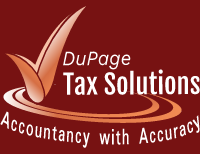
Tax and Accounting Services
About DuPage Tax Solutions
DuPage Tax Solutions is located in Naperville, IL. Our clients are mostly residents and small businesses within the Chicago metropolitan area – DuPage, Cook, Will, and Lake counties. Our remote work capabilities allowed us to extend our services nationwide. Today, we pride ourselves in having clients from all 50 states. Our virtual services are fast, easy, and convenient. Clients submit and review documents electronically through our secured online portal.
Business Interest Expense: Is it Deductible?

For many companies, interest expenses constitute a significant portion of their operating costs, which is why the deduction of these expenses is a valuable tax benefit for businesses. Understanding this deduction can help business owners manage their finances more effectively and optimize their tax strategy.
Home » Business Interest Expense: Is it Deductible?
What is the Business Interest Expense Deduction?
The deduction allows companies to deduct interest paid on loans taken out for operational needs. Specifically, this can include interest on loans for equipment, inventory, working capital, or other necessary expenses.
Who qualifies for the interest deduction?
Most businesses, including sole proprietorships, partnerships, corporations, and LLCs, can qualify for the deduction. Here are key points to consider:
Firstly, the interest must be for a legitimate business purpose. Personal loans or credit card interest do not qualify.
Secondly, if any part of the loan is not for business purposes, businesses must reduce the deductible interest proportionately. For example, if a loan is partially used for personal expenses, only the business-related portion can be deducted.
Limit on the business interest deduction
The Tax Cuts and Jobs Act (TCJA) established limitations on the deductible interest. Generally, businesses can deduct business interest expenses up to the sum of:
- Business Interest Income
- 30% of Adjusted Taxable Income (ATI)
- Floor Plan Financing Interest
Further, Adjusted Taxable Income (ATI) is calculated without regard to:
- Nonbusiness income, gains, deductions, or losses
- Business interest income or expense
- Net operating losses
- The 20% qualified business income deduction for pass-through entities and sole proprietorships
Small business exemption
Presently, small businesses with average annual gross receipts of $30 million or less (for 2024) can fully deduct their interest without limitations. Additionally, certain real estate and farming businesses can elect out of the deduction limitation, allowing for more flexibility in managing their interest expenses.

What if your business interest expense is not fully deductible?
Typically, if your interest expense exceeds the allowable deduction, you may be able to carry forward disallowed interest expenses indefinitely. However, the carryover rules depend on your business structure:
Partnerships: Disallowed interest is treated as excess interest allocated to each partner and is not carried forward.
S Corporations: Disallowed deduction is carried forward to the succeeding tax year.
C Corporations: Disallowed interest can also be carried forward, but current-year interest expenses are deducted before any disallowed interest from previous years.
Maximizing your interest deduction
To make the most of the business interest expense deduction, consider these tips:
First, keep detailed records of all loans and interest payments to substantiate your deductions.
Second, evaluate financing options to identify opportunities for better interest rates or terms.
Finally, plan for future interest expenses. If you anticipate needing financing, structure loans to maximize deductibility.
Wrapping up
Altogether, interest deduction can play an essential role in tax planning for business owners and help maximize profit. Always consult with a tax professional to navigate the intricacies of the tax code and make the most of your expenses.
You May Also Like These


Top Tax Mistakes Business Owners Make

Cash Flow Made Simple

Home Office Tax Rules to Know
Ready to Take Control of Your Finances?
Contact us today for personalized tax, accounting, and advisory services tailored to your needs. Let’s work together to achieve your financial goals!

Contact Info
Ph. (630) 909 9700
Email: DPTax@DP-Tax.com
Mail address:
1552 Illinois Rte 59 #1037
Naperville, IL 60564
Business Hours
Mon: 11 am – 7 pm
Tue: 11 am – 7 pm
Wed: 11 am – 7 pm
Thu: 11 am – 7 pm
Fri: 11 am – 7 pm
Sat: 12 pm – 5 pm
Sun: CLOSED
Helpful Links
© 2024 DuPage Tax Solutions | Site Map | Privacy Policy | Disclaimer
